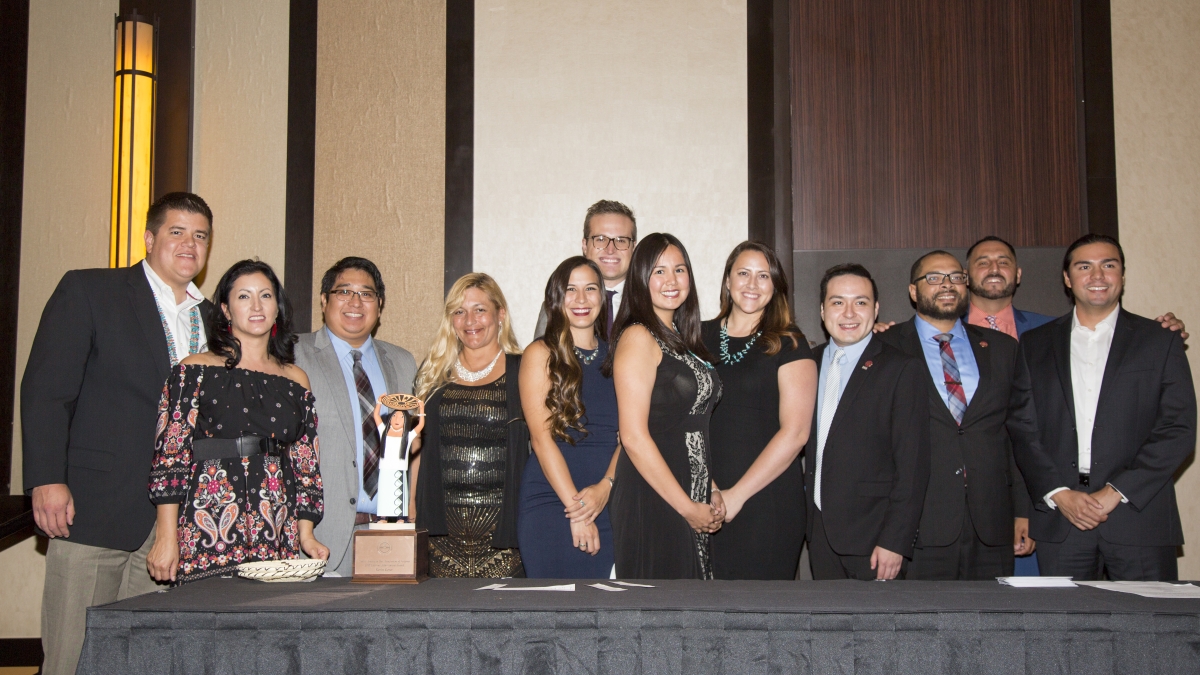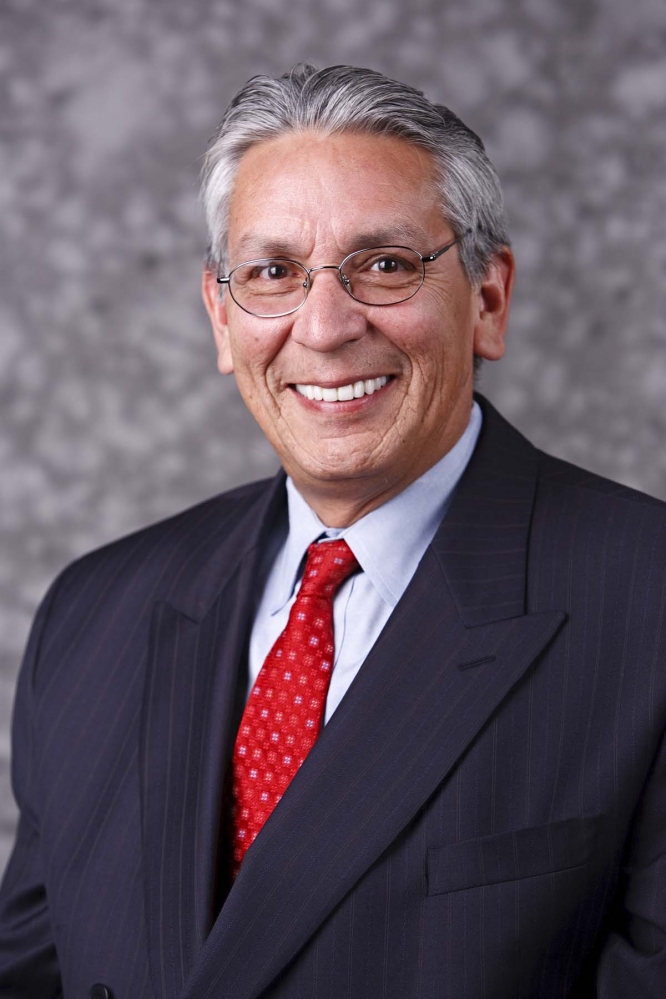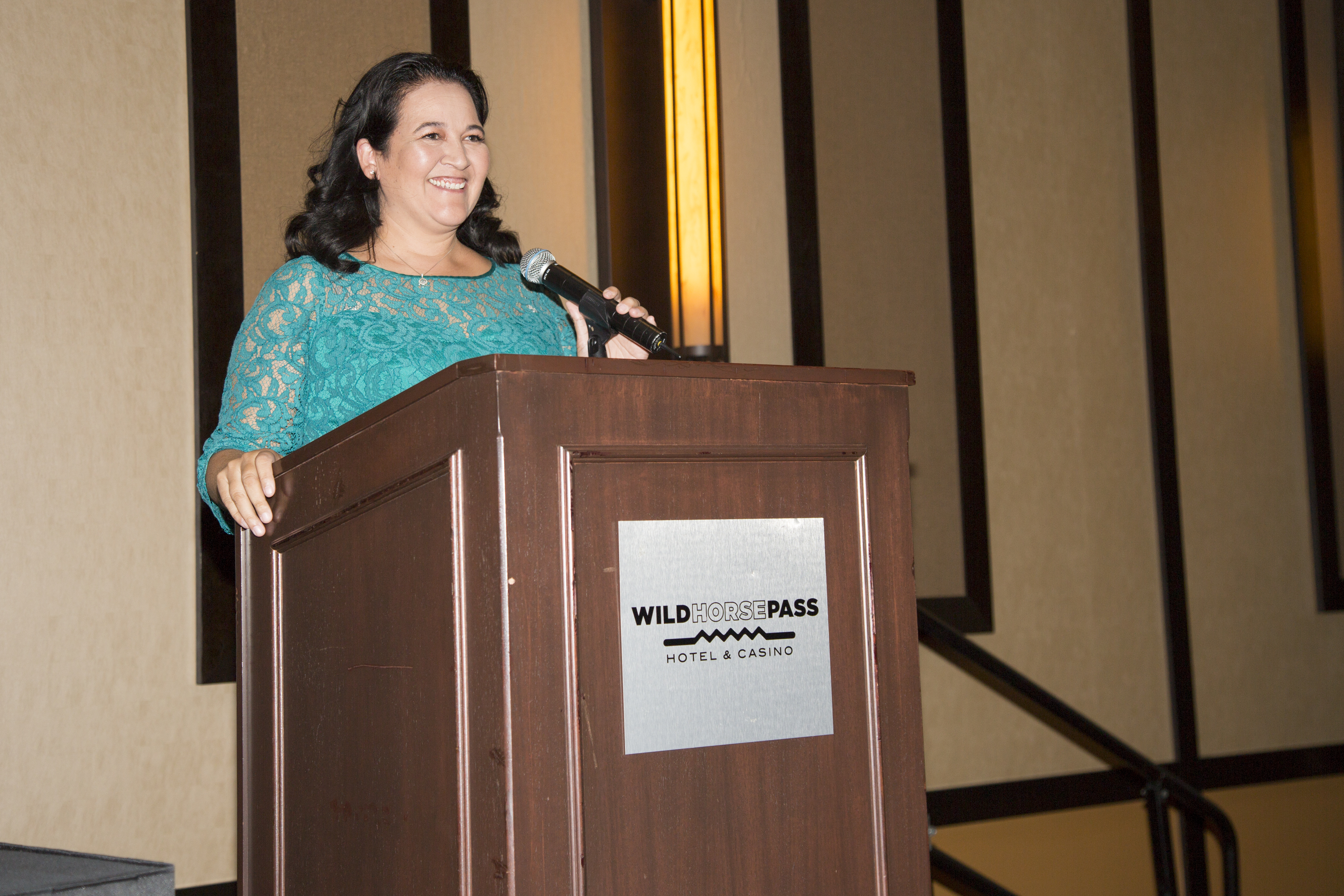ASU Law faculty honored at Native Bar Association’s awards

The Native American Bar Association of Arizona's annual celebration featured an auction, which raises money for scholarships. This year, 11 students received $1,000 each.
The Native American Bar Association of Arizona (NABA-AZ) recently held its ninth annual Seven Generations Awards Dinner and Silent Auction, to honor current law professionals and award scholarships to law students. It was a banner night for the Sandra Day O’Connor College of Law at Arizona State University, as two faculty members were honored with the organization’s top awards.
Kevin Gover, a tenured professor with ASU Law, was given the Lifetime Achievement Award, and Kathlene Rosier, executive director of ASU Law’s Indian Legal Program, received the Member of the Year Award.
Lifetime Achievement Award
Gover, a member of the Pawnee Tribe of Oklahoma who is currently on leave from ASU Law to serve as the director of the Smithsonian Institution’s National Museum of the American Indian in Washington, DC, was honored for an influential career in government, higher education and private practice.
After establishing what became the largest Indian-owned law firm in the country in New Mexico in the 1980s, he was nominated by President Bill Clinton to serve as the assistant secretary for Indian Affairs in the U.S. Interior Department in 1997, where he served until 2001.
His tenure with Indian Affairs was noteworthy for the improvements made with Indian schools and tribal police forces — as well as a landmark apology from the federal government.
“He was responsible for having the first formal apology written to tribes on their historical treatment by the U.S. government,” Rosier said. “That was a landmark statement coming from any type of official government, and it meant a lot to tribes across the country.”
Kevin Gover
Gover joined the faculty at ASU Law in 2003, where he has taught courses on federal Indian law, administrative law, and statutory interpretation, as well as an undergraduate course in American Indian policy.
“When he was hired at ASU, they wanted somebody who was a very well regarded national leader and thinker, and Kevin Gover fit the mold for that.” Rosier said. “Because he’s considered a thought leader, he was asked to join the Smithsonian to take over and make sure the museum is doing things that reflect what’s going on in Indian country, and he’s doing a great job of that.”
Rosier added that Gover — as he has done throughout his life — is trying to reshape the way people think about Native Americans, trying to correct misconceptions about historical events and figures, such as the first Thanksgiving and Pocahontas.
Jeff Harmon, president of NABA-AZ, said Gover is highly respected in the Indian law community. Those sentiments were evident in the anonymous commentary accompanying Gover’s nomination for the award: “Kevin is regarded as a role model for so many younger Indian law attorneys, especially those who are Native. Kevin, like so many of us, came from small towns and humble reservation roots to attend college and law school with the hope of practicing Indian law and making a difference. Kevin inspires the younger generation of Indian law attorneys to give back to our elders, to the Indian youth and our native communities.”
Although he could not attend the Seven Generations ceremony, Gover issued the following statement, which was read by fellow ASU Law Professor Robert Clinton, who accepted the award on Gover’s behalf:
“Thank you for this honor. I regret very much that I cannot be there in person to see you all. I met a Nobel economist a couple of years ago whose work demonstrated that the most important factor in an individual’s career success is luck. That is certainly the case for me. Whether measured by the serendipitous opportunities I have had, or the quality and commitment of the colleagues and friends with whom I have worked, I have been very lucky indeed. And my greatest good fortune comes in being father and husband to the best people I know. So I thank you for this award. Thanks especially to those of you I have worked with and learned from. For those of you who continue to keep the faith and fight the good fight, please know you have my respect and admiration.”
Member of the Year Award
Rosier, a member of the Comanche Tribe, joined ASU Law in 2000. She served as the director of the Indian Legal Program for 11 years, left in 2011 to become the assistant general counsel for the Fort McDowell Yavapai Nation, then returned to her position with ASU Law in 2014.
“Kate is a very talented lawyer with a compassionate heart,” said Patricia Ferguson-Bohnee, a professor and faculty director in the Indian Legal Program. “We are really lucky to have Kate as the executive director of the Indian Legal Program.”
NABA-AZ was founded in 2007 as a nonprofit organization created to advance and improve the practice of Indian law and promote the professional development of its members. Rosier was honored that both she and Gover were recognized by NABA-AZ, because the organization and the Indian Legal Program at ASU Law are so closely aligned in their goals.
“I was really excited, because we’ve been doing a lot of important work here in the Indian Legal Program, helping to increase the number of Native students going into the legal profession,” she said. “So I think that being recognized by the group was a real testament that people are recognizing the hard work we’re putting into this process.”
Kathlene Rosier
Rosier said that of the 1.3 million attorneys in the United States, only 2,600 are Native Americans. So in an effort to boost numbers, ASU Law started the Native American Pipeline to Law Initiative. The initiative is a national partnership with other schools — including the University of California at Berkeley, Michigan State, the University of Washington, and the University of South Dakota — designed to help Native students be more successful in the law school admissions process. Pre-law students are given general advice on the entire admissions process, as well as tips for the LSAT exam.
“She is committed to improving the legal landscape for Indian tribes across the country,” said Ferguson-Bohnee, citing the Native American Pipeline to Law Initiative. “She created this initiative in response to a 2015 study showing that Native Americans are sorely unrepresented in law schools and the legal profession, creating access to justice issues in Indian Country. Through this initiative, Kate set forth goals to respond to the issues addressed in the study regarding access to law school, raised money to fund the initiative, and developed partnerships across the country with bar associations, educational institutions, and tribal communities.”
Although she was individually recognized, Rosier considers the NABA-AZ recognition a team award, validating the efforts and success of the entire Indian Legal Program.
“We want to continue to be a leader in the United States for Indian law programs,” she said. “We want to make sure that the students we’re recruiting are successful and are going to be the future leaders of Indian Country. Whether it’s in the legal profession, or leaders of their tribes, or tribal courts, politics. We want to make sure that we give them the skills to be successful in whatever they choose to do.”
Focused on the future
The Seven Generations event was held Sept. 9 at the Wild Horse Pass Hotel and Casino, on the Gila River Reservation. The event’s moniker reflects a Native American ideal when it comes to planning ahead.
“When planning or thinking about leadership and future things that are going to affect the tribe, they’re told to think seven generations ahead, and how it will affect not only your children, but your grandchildren’s grandchildren,” Rosier said. “So it’s a Native way of thought about how to look forward.”
In addition to the awards, the annual celebration features an auction, which raises money for scholarships. This year, 11 students received $1,000 each, and the NABA-AZ has awarded over $65,000 in scholarships since 2008.
“I think it’s a great event that shows what an impact the Indian Legal Program is making, not only in Arizona but what it’s doing nationally,” said Rosier, who noted that most of the board’s members are ILP alumni.
And by raising money for scholarships, the organization helps carry on the pay-it-forward focus of the Seven Generations tradition.
“Any money we make we’re trying to give back to students, so that they can be successful as well,” she said. “And I think that shows how committed the organization is in trying to help out the next generation.”

